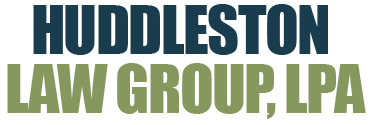Estate Planning in the 21st Century
Huddleston Law Group, LPA
The Impact of Longevity on Estate Planning
The term "Estate Planning" is not a very useful term. Over the years, we have learned that most folks think it is the document you sign to make sure that when you die, your property goes where you want it to go. Unfortunately, what passes for estate planning in many firms is not much more than that.
We think in the 21st century, a better term than "Estate Planning" is "Wealth and Health Planning."
Have you noticed we are living longer? When Social Security was first established to provide "safety net" benefits to seniors when they turned 65, the average age of the American male at death was 62! Today, a 65-year-old couple has an almost 50/50 chance that one of them will live to 95. For most of us, not all of those will be good years.
Estate planning's biggest challenge today is not what happens when we die... it is what happens when we don't die. We are now outliving our mental and/or physical capacity to care for ourselves and our assets.
This longevity creates problems our parents and grandparents almost never faced. We are marrying later and living longer, resulting in a need for 60-year-olds with careers, spouses, and college-age children to take over management of the personal, medical and financial affairs of their 80- and 90-year-old parents. And it is no longer unusual in our practice for 80-year-old "children" to be caring for 100-year-old parents.
Increasing divorce rates aggravate the problem. Some adult children have divorced (and sometimes remarried) parents living in more than one city or state. Some adult children, themselves divorced, are trying to raise their own families at a time when their parents begin needing help.
Whatever the situation, 21st-century culture and 21st-century medicine are combining to create previously unimagined challenges to the care of older Americans. The bad news is that the legal profession has been slow to adjust to these new challenges. The good news is that some lawyers and their financial colleagues have been hard at work on solutions.
The first solution is organization. Parents of any age have an obligation to themselves, their spouses and their children to organize their affairs and keep them organized. What do I have? Where is it? How do I get to it? What is it for? What are its tax consequences? Who would my loved ones contact to learn how to handle it?
Our "Wealth and Health" planning starts with a personal and financial "X-ray" designed to provide a complete picture of everything we need to know in the event of a health reversal. And our estate planning portfolios contain a checklist to help keep information organized.
The second solution is teamwork. The problem with LegalZoom.com and other do-it-yourself planning tools is that you are, by definition, planning for a time when you are not able to manage your own affairs, either due to incapacity or death. I've never seen a document jump up out of a drawer and administer itself, any more than the government's written plans did anything in the wake of Hurricane Katrina. Plans are not self-administering. They need administrators. The administrators need to know the plan, how to implement the plan, and who they can call upon for help.
So don't do this alone. And don't do it with a single lawyer or financial advisor either. Proverbs tells us there is wisdom in an abundance of counselors. You have seen many reports of elderly persons getting ripped off by an unscrupulous lawyer or broker, but you've never seen a report of the lawyer, accountant and financial advisor as a team conspiring to steal from an elderly client.
As a firm, we strongly prefer to work with clients who have a financial advisor, and sometimes an accountant, to participate with us in their planning. For most of our clients, we want all advisors to participate in — or at least be aware of — the clients' planning: Accountant, financial advisor, investment advisor, insurance professional and (for aging clients) the child or children or other person(s) who will take over personal, medical and financial decision-making if clients lose the ability to make responsible decisions for themselves.
In the modern medical world, and especially the post-HIPAA world where medical providers are fearful of working with family members and family attorneys, a good "estate plan" requires a combination of medical waivers, instructions to physicians, comprehensive powers of attorney ... and good organization of all the personal, medical and financial information. Our estate planning portfolios contain organizing tools and informal instructions as well as binding legal documents.
The enemies of your goals and your plan are disorganization and discontinuity. Our challenge is to create specific processes to achieve dependable outcomes for you and your loved ones. If you plan well, maintain your plan, and choose trustworthy implementers, your plan will work for you and your loved ones. There are no shortcuts.
Copyright Huddleston Law Offices, LPA
Materials may not be reprinted or used without written permission
The subject matter information presented on this website is of a general nature, designed to provide an overview of various subjects, and most of it is not Ohio-specific. The authors, publisher and host are not providing legal, accounting, or specific advice to your situation.

Share On: